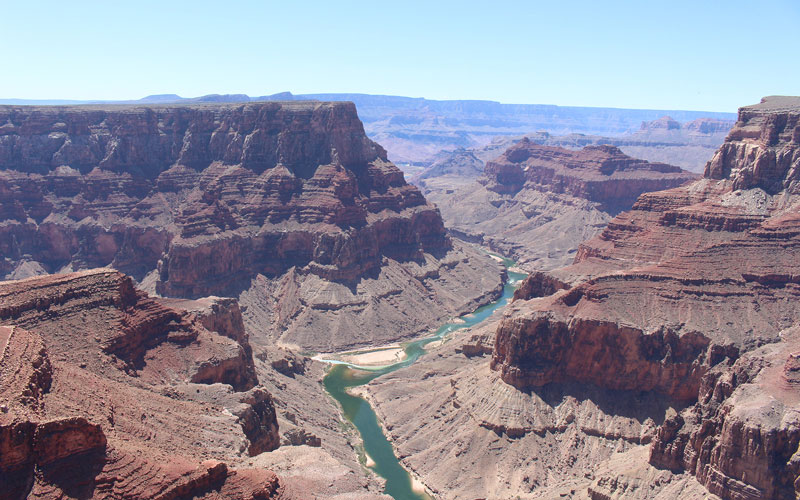
The confluence of the Colorado and Little Colorado rivers is part of the Grand Canyon National Park, but efforts to get President Barack Obama to declare an additional 1.7 million acres around the park a national monument appear to have failed. (Photo by Sophia Kunthara/Cronkite News)
WASHINGTON – President Barack Obama will leave office Friday without declaring a new 1.7 million acre national monument around the Grand Canyon, Arizona lawmakers said this week.
Both congressional opponents and supporters of the Greater Grand Canyon Heritage National Monument Act said Obama will not make the declaration, which would permanently put affected lands off-limits to new uranium mining and logging.
Some environmentalists are still holding onto hope that Obama will act before Friday. But Rep. Raul Grijalva, D-Tucson, and a supporter of the designation, said he received word from the White House that Obama would not act, partly blaming Interior Secretary Sally Jewell.
“I’m disappointed and actually quite frustrated with the Interior secretary. She’s had all the information for about eight months and she didn’t go to the president to act on it,” Grijalva said.
That, despite the fact that an online petition to protect the area got as many as 900,000 signatures, he said. Grijalva said he has little hope for a monument designation under the administration of incoming President Donald Trump, but would move forward to protect the Grand Canyon in other ways, including legislation limiting gas, oil and mining.
While Grijalva was disappointed, Sen. John McCain, R-Arizona, said he was satisfied to hear that the president will not take executive action to “lock up” the land. Obama on Dec. 28 used his authority under the Antiquities Act to protect the Bears Ears in Utah and Gold Butte in Nevada, two new monuments that cover 1.6 million acres.
“President Obama seems to have heard the message that Arizonans are not on board with plans for Washington to lock-up another 1.7 million acres in our state,” McCain said in a statement released by his office.
“As frustrating as it is to see federal land grabs in Utah and Nevada, we are encouraged that the administration does not appear to be moving toward another national monument designation in Arizona at this time,” McCain’s statement said.
He and fellow Sen. Jeff Flake, R-Arizona, opposed the monument designation, saying the lands are already protected and that the monument would hurt the hunting and tourism industries. The two wrote to Obama in October urging him not to use his authority to designate a national monument around the Grand Canyon park.
But supporters of the monument accused Republican lawmakers of misrepresenting the issue, both for the potential executive action and for a Grijalva bill from the last Congress, which he reintroduced this year, that would do the same thing legislatively.
“They do not tell the truth about what is in Grijalva’s bill. They basically misrepresent the facts about what the monument would do,” said Randi Spivak, the public lands program director for the Center for Biological Diversity.
Spivak said the monument proposal would not have hurt hunting or tourism, and that it has enormous support from the majority of Arizonans
“I don’t know who they are speaking for but they are not speaking for the Native tribes, and they are certainly not speaking for the overwhelming majority of the people in Arizona,” she said.
But an official with the Sierra Club said that while she is disappointed, she is not giving up hope that Obama will act.
“We have been disappointed, but he still has two days and we are still asking him to do that along with the supporting tribal nations,” said Sandy Bahr, director of the Sierra Club’s Arizona chapter.
Bahr said if the president does not establish the monument in the next few days it will make protecting the Grand Canyon much harder and make the current mineral withdrawal – a 20-year moratorium on new uranium mining that began in 2012 – critical in preserving the land. Bahr worries that the incoming Trump administration could work to reverse the moratorium, which keeps the land off limits to new uranium mines until 2032.
“They can’t just snap their fingers as perhaps the president-elect might think, he still has a responsibility to the public and for public involvement and opportunity to comment. The mineral withdrawal took several years of significant public involvement and there’s a lot of support,” Bahr said.